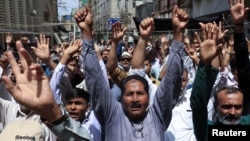As Pakistan’s military leaders met recently with US President Donald Trump, Secretary of State Marco Rubio, and special envoy Steve Witkoff at the White House, its regional ally Iran was being hit with a missile barrage from Israel -- Islamabad's main regional adversary and a staunch American ally.
Amid escalating regional tensions, the two events highlighted the complex diplomatic chessboard Pakistan faces as it balances relations with rival powers, strained sectarian ties, and strategic interests in a region fraught with shifting alliances, proxy conflicts, and economic rivalries.
Pakistan has always faced difficult choices in balancing its relations with both the United States and China. But managing its ties with Iran and other Middle Eastern states presents an even greater challenge on many fronts.
The recent 12-day bombing campaign by Israel and the United States against Iran’s nuclear and military sites further added to the complexity when Pakistan’s army chief, Field Marshal Asim Munir, held an unprecedented face-to-face with Trump where they spoke for more than two hours.
Little was publicly announced about the meeting, other than Munir noting Pakistan's "deep appreciation" for US diplomatic efforts to end a four-day outbreak of hostilities between Pakistan and India in May.
Even less came from the White House, which held the event behind closed doors. No statement was issued on the meeting and Trump's only comments were that he was "honored" to meet Munir.
"Pakistan now faces the daunting challenge of lending support to Iran without antagonizing Saudi Arabia and the United Arab Emirates, its two biggest financial supporters, and irritating the United States, with whom Pakistan seeks to improve ties," Sahar Khan, an independent South Asia analyst, wrote in a blog post for the Atlantic Council.
Iran’s military engagement with Israel has become one of the few occasions when a majority of Pakistani Sunni Muslims have expressed support for predominantly Shi'a Iran, driven by the premise of “the enemy of my enemy is my friend.”
While most Pakistanis view Israel as their second-greatest adversary after neighboring India, many still harbor little sympathy for Iran, mainly because of sectarian rivalries.
In Pakistan, hardline Sunni groups often label Shi'as as kafir (infidels), and the sentiment is often reciprocated.
Approximately 80-85 percent of Pakistan’s estimated 250 million inhabitants are Sunni Muslims, whereas Shi'as comprise about 90-95 percent of Iran’s population.
Pakistan has privately voiced concerns about Iran’s influence over Pakistani Shi'a Muslims, particularly in the Kurram tribal district, located in the restive northwestern Khyber Pakhtunkhwa Province, and Gilgit-Baltistan, part of the Kashmir region -- an autonomous territory that has been disputed between India and Pakistan since 1947, and between India and China since 1959.
Iran suspects Pakistan of supporting the anti-Shi'a, anti-Iran militant group Jaish al-Adl, which operates in Iran’s Sistan-Baluchistan Province. The two countries share a roughly 900-kilometer-long border, which is frequently plagued by human and narcotics smuggling.
Balancing Act
Despite occasional ups and downs, Pakistan’s relations with Iran have remained generally stable, with both countries supporting each other at the United Nations and other international forums.
But balancing relations with Iran and Saudi Arabia -- two major ideological rivals in the Middle East -- adds further complications.
“In reality, [Pakistan's] history of joining alliances makes it difficult, as its alliances with the United States, China, and Saudi Arabia reduce its flexibility to deepen ties with these powers’ rivals,” Michael Kugelman, senior fellow at the Asia Pacific Foundation, told RFE/RL.
Kugelman believes Pakistan’s approach contrasts sharply with rival India, which has avoided alliances to maintain the very diplomatic flexibility that Pakistan lacks.
That lack of flexibility has made it more difficult for Islamabad. However, over the past 18 months, Tehran and Riyadh have taken steps to improve relations -- a development that also benefits Pakistan.
“The Iran-Saudi Arabia rapprochement deal has given Pakistan more diplomatic space to engage with Iran, and Israel’s recent attacks on Iran have underscored Pakistan-Iran convergence due to their shared concern about Israel,” Kugelman said. “But it all still makes for a delicate diplomatic act for Pakistan to carry out.”
Religion also plays a part in this delicate diplomatic balancing act.
Like Pakistan, Saudi Arabia is a Sunni-majority country, while the pre-dominantly Shi'a Iran is an ideological rival of Saudi Arabia.
Khalid Sultan, a professor at the National University of Modern Languages (NUML) in Islamabad, said these sectarian differences often manifest themselves in foreign policy.
"Ideological divides, strategic realignments in the region, Afghan theater and border security, and militancy are the main complexities in Pakistan-Iran relations," he added.
"Iran's rivalry with Saudi Arabia vis-a-vis the proxy wars in Syria, Iraq, and Yemen, often put Pakistan in a tight diplomatic spot."










